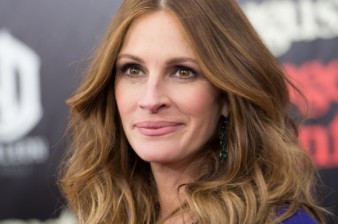
19/05/2015 10:11
Julia Roberts plays Mother Earth and Harrison Ford stars as the Ocean as Hollywood A-list 'speaks out for nature'
Ecosystem services. You’ve nodded off already, haven’t you? But wake up! Here are some Hollywood A-listers making a decent attempt to move beyond the obscure jargon and reveal the existential nature of what the Earth provides for humanity.
The Nature is Speaking initiative is organised by Conservation International with the tag-line: “Nature doesn’t need people. People need nature.” In the series of short films, a part of the world’s abused ecosystem is voiced by a star. Harrison Ford is the angry ocean and Julia Roberts an imperious Mother Nature.
“I have been here 22,500 times longer than you. I don’t really need people, But people need me,” says Roberts, imbuing her Mother Nature with a steely, take-it-or-leave-it edge.
“I have fed species greater than you and I have starved species greater than you,” Mother Earth warns. “Your actions will determine your fate, not mine.”
Harrison Ford as the Ocean is the most ominous. “Humans, I don’t owe them a thing. I give, they take. But I can always take back,” he says, in his growliest tones. “They poison me then expect me to feed them. [But] I covered this entire planet once and I could always cover it again. That’s all I have to say.”
Other star turns released so far include Kevin Spacey as a cruelly sarcastic Rainforest: “Humans are so smart, such big brains, opposable thumbs. They know how to make things, amazing things. Why would they need an old forest like me any more? Jungles? Trees?” he asks. “Well they do breathe air, and I make air. Have they thought about that? Humans, making air. That’ll be fun to watch.”
Edward Norton is the Soil, the thin layer providing the world’s food. He’s direct too: “Without me, humans could not exist. But you treat me like dirt. I am aching, broken, withering away. Are you paying attention? I am turning to dust.”
The final film released so far is Penélope Cruz as Water. Like the others, she issues a warming: “I am something humans take for granted, But there is only so much of me, and more and more of them every day.” But she also raises the possibility of action to combat water shortages: “Will they wage wars over me like they do over everything else? That’s always an option, but it’s not the only option.”
Throwing star dust at a problem certainly gets publicity: Leonardo di Caprio at the UN climate summit in New York recently generated far more coverage than such a meeting would normally command.
I also think the framing of nature as entirely capable of coping with whatever humans throw at it – just not necessarily being able to support civilisation at the same time – is a timely antidote to our frequently anthropocentric viewpoints.
The films are certainly doom-laden, which some believe can leave people feeling impotent. But they are also a challenge. As Robert’s Mother Earth says: “I am prepared to evolve. Are you?”
What do you think – are the films an effective way to raise awareness of environmental issues?








